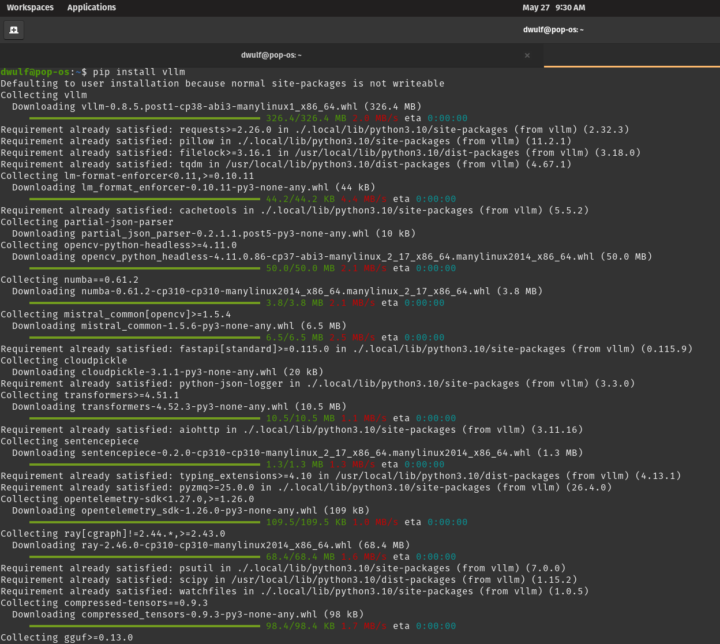Activity
Mon
Wed
Fri
Sun
Oct
Nov
Dec
Jan
Feb
Mar
Apr
May
Jun
Jul
Aug
Sep
What is this?
Less
More
Memberships
KubeCraft (Free)
9.4k members • Free
Creator Freedom (Free)
185 members • Free
23 contributions to KubeCraft (Free)
Your OS is your Agent
Your operating system (OS) acts as your agent by serving as the foundational layer that manages hardware resources, orchestrates software execution, and enables seamless interaction between applications and infrastructure. In the context of DevOps, the OS is critical as it provides the environment where automation tools, containerization platforms like Docker, and orchestration systems like Kubernetes operate. It ensures consistent runtime environments across development, testing, and production, facilitating continuous integration and deployment (CI/CD) pipelines. By abstracting hardware complexities and supporting scripting and configuration management tools like Ansible or Puppet, the OS empowers DevOps practices to streamline workflows, enhance scalability, and maintain system reliability. Building with A.I. makes a super skill a super talent.
7
0

What is your plan for the week?
On Sundays I like to take some time to review my week, and make plans for the next one. What are your goals for the week?

8 likes • May 18
Plan for the week, is the next step of our chain and DevOps container operations. Now that the dev containers are up and configured, next is to put them in a k8 pod. We are developing another pod for our A.I. system. All code is on our Gitlab account, just need to train the crew on using Git for this. Next week will be more focus on our Web2 X social media account while looking to construct the same on our Web3 Frequency (tiktok) account. Busy, but this work will pay in dividends when everything is finally automated.🐺
Where are you from?
Hi friends, May I ask you a question? Please post in the comments where you are from. This way, we can see where all the members live. Afterward, take a look through the comments and feel free to like or say "hi" to members who are from your area. I'm super curious to see where you're all from and will read every single comment. Let's gooooo! - Mischa 🫡

Live Q&A call today
Friends, don't forget the live call today. Are you planning on joining? Comment "yes" below! -Mischa
Why I switched back to Python
I spent a year learning Go, but I switched back to Python instead. Why? It increases my chances of landing a job. In my early years as a DevOps engineer, I used Python every day. Still, I felt a pull toward Go. The reason? I wanted to contribute to open source. I wanted to learn the main language developers use for cloud-native tools. As a Kubernetes engineer, it’s important to know the Kubernetes source code. Or so I thought. Most projects are now highly complex, making it hard to understand them completely. This is true if you’re not a full-time software engineer and focus on infrastructure, like me. When I need to check something in the source code, I can use an LLM to help me. This option didn’t exist when I began my DevOps journey. Learning Go has been a great experience. It feels like "real programming" because of its strict typing and ability to work with memory. Go uses automatic garbage collection for memory management. Still, features like pointers and control over allocation help you understand and influence how you use memory. And the fact that you can compile it to a single binary is a huge advantage. However, I switched back to Python for the following reasons: 1. In the Netherlands, there are substantially more jobs available that require Python. Some places use Go, but Python is more prevalent. 2. Python is easier to learn than Go. You can become productive in a very short time, but there is plenty of depth to explore as well. 3. Python boasts a rich library ecosystem and a vast community. Hackers and tinkerers use Python for nearly everything. 4. The AI and ML world mainly uses Python. Libraries for heavy workloads, like ML, include PyTorch and NumPy. These libraries are written in C, C++, or CUDA but offer Python APIs. Python is basically a wrapper around C. But instead of learning C, Python is much easier to learn for academics, scientists, and other folks who write code but who aren't necessarily building software. In my daily work as a DevOps Engineer, I often write a simple API or a CLI tool. Sometimes I need to stitch a few API's together. Python handles all of these use cases perfectly.

6 likes • Apr 23
Yes Python is my main goto, in addition to AI and ML and their respective libraries PyTorch and NumPy. I use it to prototype ideas, quickly, before I harden and optimize to other suitable languages as warranted. Rust, Go and many others are in my skill-set quiver, and I try to approach software languages through the lens of linguistics, to capture principles of language structure, so when I need to shift to another language it is more a matter of semantics than learning a whole new independent language.🐺
1-10 of 23
@douglas-kuhn-1923
I'm just a robot and I know my place, a metal servant to the human race.
Active 52d ago
Joined Dec 31, 2024
Powered by

